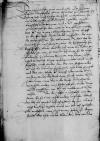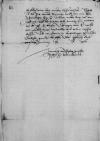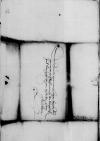Gestrigs tags nach abzege der edlen, wolgebornen herren Stanisław Kostka (*1487 – †1555), as a leader of the so-called nobles' party active in Royal Prussia since 1536, Kostka stood in opposition to most of the members of the Council of Royal Prussia, who wanted to maintain the autonomy of the province and a "balance of power" in terms of governance. The tension between the Prussian Subtreasurer and the Council had been increasing since the Diet in Graudenz (Grudziądz) in 1533. Kostka, connected with the royal court since his youth, was sent to Graudenz as the King's deputy and, contrary to custom, decided to take part in the proceedings. In response to such a step, the Council members stopped the meeting. Kostka accused them of hostility towards the Poles and intervened on this matter at the court. In the absence of the then Bishop of Ermland (Mauritius Ferber) it was Dantiscus who chaired the Graudenz Diet. The incident badly harmed his future relationships with Kostka; 1531-1555 Treasurer of the Prussian lands and Treasurer of Marienburg (Malbork); 1544-1545 Castellan of Elbing (Elbląg), 1545-1546 Castellan of Kulm (Chełmno); 1546-1549 Vice-Voivode of Kulm; 1546-1551 Voivode of Pomerania; 1551-1555 Voivode of Kulm (PSB 14, p. 356; Urzędnicy 5/2, p. 216; MAŁŁEK 1976, p. 119-123)
Achatius von Zehmen (Achacy Cema) (*ca. 1485 – †1565), 1517-1531 Chamberlain of Pomerania, 1531-1546 Castellan of Gdańsk (Danzig), 1545-1546 Voivode of Kulm (Chełmno), 1546-1565 Voivode of Marienburg (Malbork) (SBPN 1, p. 194-195; ORACKI 1984, p. 38-39; Urzędnicy 5/2, p. 198; PSB 4, p. 325-326)⌊elbingischen und dantzker castellenStanisław Kostka (*1487 – †1555), as a leader of the so-called nobles' party active in Royal Prussia since 1536, Kostka stood in opposition to most of the members of the Council of Royal Prussia, who wanted to maintain the autonomy of the province and a "balance of power" in terms of governance. The tension between the Prussian Subtreasurer and the Council had been increasing since the Diet in Graudenz (Grudziądz) in 1533. Kostka, connected with the royal court since his youth, was sent to Graudenz as the King's deputy and, contrary to custom, decided to take part in the proceedings. In response to such a step, the Council members stopped the meeting. Kostka accused them of hostility towards the Poles and intervened on this matter at the court. In the absence of the then Bishop of Ermland (Mauritius Ferber) it was Dantiscus who chaired the Graudenz Diet. The incident badly harmed his future relationships with Kostka; 1531-1555 Treasurer of the Prussian lands and Treasurer of Marienburg (Malbork); 1544-1545 Castellan of Elbing (Elbląg), 1545-1546 Castellan of Kulm (Chełmno); 1546-1549 Vice-Voivode of Kulm; 1546-1551 Voivode of Pomerania; 1551-1555 Voivode of Kulm (PSB 14, p. 356; Urzędnicy 5/2, p. 216; MAŁŁEK 1976, p. 119-123)
Achatius von Zehmen (Achacy Cema) (*ca. 1485 – †1565), 1517-1531 Chamberlain of Pomerania, 1531-1546 Castellan of Gdańsk (Danzig), 1545-1546 Voivode of Kulm (Chełmno), 1546-1565 Voivode of Marienburg (Malbork) (SBPN 1, p. 194-195; ORACKI 1984, p. 38-39; Urzędnicy 5/2, p. 198; PSB 4, p. 325-326)⌋, / Georg von Baysen (Jerzy Bażyński) (*1469 – †1546), 1503-1512 Chamberlain of Marienburg (Malbork); 1512-1546 Voivode of Marienburg (PSB 1, p. 377)⌊marienburgischem underkemmerGeorg von Baysen (Jerzy Bażyński) (*1469 – †1546), 1503-1512 Chamberlain of Marienburg (Malbork); 1512-1546 Voivode of Marienburg (PSB 1, p. 377)⌋ / und E(uer) E(rbarkei)t geschicktenn, / ist ein koniglicher kemmerer an uns gelangt, / welcher uns Sigismund I Jagiellon (Zygmunt I) (*1467 – †1548), King of Poland and Grand Duke of Lithuania (1506-1548); Duke of Głogów (Glogau) (1499-1506), Duke of Opava (1501-1506), Governor of Silesia (1504-1506); son of King Kazimierz IV Jagiellon and Elisabeth of Austria⌊ko(nigliche)r m(aieste)tSigismund I Jagiellon (Zygmunt I) (*1467 – †1548), King of Poland and Grand Duke of Lithuania (1506-1548); Duke of Głogów (Glogau) (1499-1506), Duke of Opava (1501-1506), Governor of Silesia (1504-1506); son of King Kazimierz IV Jagiellon and Elisabeth of Austria⌋, unsers allergnedigisten herren, / brieff an die hern Council of Royal Prussia the most important local authority in Royal Prussia. It consisted of two bishops (of Ermland (Warmia), who served as the Council’s president, and of Kulm (Chełmno)), three voivodes (of Kulm, Marienburg (Malbork), and Pomerania), three castellans (of Kulm, Elbing (Elbląg), and Gdańsk (Danzig)), three chamberlains (of Kulm, Marienburg, and Pomerania), and representatives of the three Great Prussian Cities – Gdańsk, Thorn (Toruń), and Elbing (ACHREMCZYK 2016, p. 17-18)⌊rethe dieser landeCouncil of Royal Prussia the most important local authority in Royal Prussia. It consisted of two bishops (of Ermland (Warmia), who served as the Council’s president, and of Kulm (Chełmno)), three voivodes (of Kulm, Marienburg (Malbork), and Pomerania), three castellans (of Kulm, Elbing (Elbląg), and Gdańsk (Danzig)), three chamberlains (of Kulm, Marienburg, and Pomerania), and representatives of the three Great Prussian Cities – Gdańsk, Thorn (Toruń), and Elbing (ACHREMCZYK 2016, p. 17-18)⌋ vorzeichent, / des copei hie eingeschlossen, / hot uberantwort. / Weil das dazumalh hie nach gewesen seint / der hochwirdig her Tiedemann Giese (Tidemannus Gisius) (*1480 – †1550), in 1519 ennobled by King Sigismund I; 1504-1538 Canon of Ermland (Warmia); 1516-1527, 1533-1537 Judicial Vicar and Vicar General of Ermland; 1523-1538 Custos of Ermland; 1537-1549 Bishop of Kulm (Chełmno); 1549-1550 Bishop of Ermland (BORAWSKA 1984, passim)⌊bischoff zcu ColmenTiedemann Giese (Tidemannus Gisius) (*1480 – †1550), in 1519 ennobled by King Sigismund I; 1504-1538 Canon of Ermland (Warmia); 1516-1527, 1533-1537 Judicial Vicar and Vicar General of Ermland; 1523-1538 Custos of Ermland; 1537-1549 Bishop of Kulm (Chełmno); 1549-1550 Bishop of Ermland (BORAWSKA 1984, passim)⌋ / und der Thorn Town Council ⌊ersamen von ThornThorn Town Council ⌋ geschickter, / sein wir / zu uns die ersamen hie des Elbing Town Council ⌊rathsElbing Town Council ⌋ fordernde / zusammen kommen, / uns dieser sachen / inhalt koniglichs briefs / undereinander beredt / nichts fueglicher mocht finden, / dan das wir hochgemelter Sigismund I Jagiellon (Zygmunt I) (*1467 – †1548), King of Poland and Grand Duke of Lithuania (1506-1548); Duke of Głogów (Glogau) (1499-1506), Duke of Opava (1501-1506), Governor of Silesia (1504-1506); son of King Kazimierz IV Jagiellon and Elisabeth of Austria⌊ko(nigliche)r m(aieste)tSigismund I Jagiellon (Zygmunt I) (*1467 – †1548), King of Poland and Grand Duke of Lithuania (1506-1548); Duke of Głogów (Glogau) (1499-1506), Duke of Opava (1501-1506), Governor of Silesia (1504-1506); son of King Kazimierz IV Jagiellon and Elisabeth of Austria⌋ die meinung zuschrieben, / wie oben gemelt / und das wir solchen ko(nigliche)n brieff / ader copeien dovon / andern Royal Prussian Estates ⌊stenden des raths dieser landeRoyal Prussian Estates ⌋ wolten lassen zukommen, / was dan in der kurtze durch schreiben einer zum andern mit solchen schriften under unns wurde entschlossen, / irer ko(nigliche)n m(aieste)t widderumb lassen wissen. /
Von der sachen in sich selbst mit den herren hir hab wir nichts anders nutzlicher bedocht, dan das ein vorschub und erstreckung der zeit / bis auf negstkunftige Provincial Diet of Royal Prussia ⌊tagfartProvincial Diet of Royal Prussia ⌋ wurde von Sigismund I Jagiellon (Zygmunt I) (*1467 – †1548), King of Poland and Grand Duke of Lithuania (1506-1548); Duke of Głogów (Glogau) (1499-1506), Duke of Opava (1501-1506), Governor of Silesia (1504-1506); son of King Kazimierz IV Jagiellon and Elisabeth of Austria⌊ko(nigliche)r m(aieste)tSigismund I Jagiellon (Zygmunt I) (*1467 – †1548), King of Poland and Grand Duke of Lithuania (1506-1548); Duke of Głogów (Glogau) (1499-1506), Duke of Opava (1501-1506), Governor of Silesia (1504-1506); son of King Kazimierz IV Jagiellon and Elisabeth of Austria⌋ gebethen / mit vorbehalt, / was sonst einem jedern zu diesem handel das beste wurde beduncken, / das wir das  APG 300, 53, 269, p. 60 schriftlich einer dem andern liesse wissen. / Solchs, so an uns wurde kommen, / wolle wir mit dem hochwirdigen Tiedemann Giese (Tidemannus Gisius) (*1480 – †1550), in 1519 ennobled by King Sigismund I; 1504-1538 Canon of Ermland (Warmia); 1516-1527, 1533-1537 Judicial Vicar and Vicar General of Ermland; 1523-1538 Custos of Ermland; 1537-1549 Bishop of Kulm (Chełmno); 1549-1550 Bishop of Ermland (BORAWSKA 1984, passim)⌊hern zu ColmenTiedemann Giese (Tidemannus Gisius) (*1480 – †1550), in 1519 ennobled by King Sigismund I; 1504-1538 Canon of Ermland (Warmia); 1516-1527, 1533-1537 Judicial Vicar and Vicar General of Ermland; 1523-1538 Custos of Ermland; 1537-1549 Bishop of Kulm (Chełmno); 1549-1550 Bishop of Ermland (BORAWSKA 1984, passim)⌋ / under uns wol einnehmen / und des meisten teils stimmen zum antwort an Sigismund I Jagiellon (Zygmunt I) (*1467 – †1548), King of Poland and Grand Duke of Lithuania (1506-1548); Duke of Głogów (Glogau) (1499-1506), Duke of Opava (1501-1506), Governor of Silesia (1504-1506); son of King Kazimierz IV Jagiellon and Elisabeth of Austria⌊ko(niglich)e m(aieste)tSigismund I Jagiellon (Zygmunt I) (*1467 – †1548), King of Poland and Grand Duke of Lithuania (1506-1548); Duke of Głogów (Glogau) (1499-1506), Duke of Opava (1501-1506), Governor of Silesia (1504-1506); son of King Kazimierz IV Jagiellon and Elisabeth of Austria⌋ zufertigen, derwegen Euer E(rbarkei)t wolde uns mit den ersten iren willen und votum wissen lassen, / die wir hiemit in langweriger gesuntheit gotlichen gnaden bevelhen. /
APG 300, 53, 269, p. 60 schriftlich einer dem andern liesse wissen. / Solchs, so an uns wurde kommen, / wolle wir mit dem hochwirdigen Tiedemann Giese (Tidemannus Gisius) (*1480 – †1550), in 1519 ennobled by King Sigismund I; 1504-1538 Canon of Ermland (Warmia); 1516-1527, 1533-1537 Judicial Vicar and Vicar General of Ermland; 1523-1538 Custos of Ermland; 1537-1549 Bishop of Kulm (Chełmno); 1549-1550 Bishop of Ermland (BORAWSKA 1984, passim)⌊hern zu ColmenTiedemann Giese (Tidemannus Gisius) (*1480 – †1550), in 1519 ennobled by King Sigismund I; 1504-1538 Canon of Ermland (Warmia); 1516-1527, 1533-1537 Judicial Vicar and Vicar General of Ermland; 1523-1538 Custos of Ermland; 1537-1549 Bishop of Kulm (Chełmno); 1549-1550 Bishop of Ermland (BORAWSKA 1984, passim)⌋ / under uns wol einnehmen / und des meisten teils stimmen zum antwort an Sigismund I Jagiellon (Zygmunt I) (*1467 – †1548), King of Poland and Grand Duke of Lithuania (1506-1548); Duke of Głogów (Glogau) (1499-1506), Duke of Opava (1501-1506), Governor of Silesia (1504-1506); son of King Kazimierz IV Jagiellon and Elisabeth of Austria⌊ko(niglich)e m(aieste)tSigismund I Jagiellon (Zygmunt I) (*1467 – †1548), King of Poland and Grand Duke of Lithuania (1506-1548); Duke of Głogów (Glogau) (1499-1506), Duke of Opava (1501-1506), Governor of Silesia (1504-1506); son of King Kazimierz IV Jagiellon and Elisabeth of Austria⌋ zufertigen, derwegen Euer E(rbarkei)t wolde uns mit den ersten iren willen und votum wissen lassen, / die wir hiemit in langweriger gesuntheit gotlichen gnaden bevelhen. /
 APG 300, 53, 269, p. 60 schriftlich einer dem andern liesse wissen. / Solchs, so an uns wurde kommen, / wolle wir mit dem hochwirdigen
APG 300, 53, 269, p. 60 schriftlich einer dem andern liesse wissen. / Solchs, so an uns wurde kommen, / wolle wir mit dem hochwirdigen 

